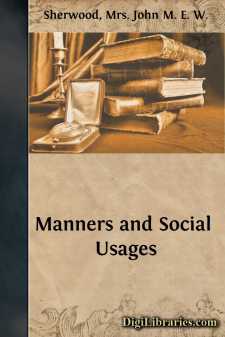Categories
- Antiques & Collectibles 13
- Architecture 36
- Art 48
- Bibles 22
- Biography & Autobiography 813
- Body, Mind & Spirit 142
- Business & Economics 28
- Children's Books 15
- Children's Fiction 12
- Computers 4
- Cooking 94
- Crafts & Hobbies 4
- Drama 346
- Education 46
- Family & Relationships 57
- Fiction 11828
- Games 19
- Gardening 17
- Health & Fitness 34
- History 1377
- House & Home 1
- Humor 147
- Juvenile Fiction 1873
- Juvenile Nonfiction 202
- Language Arts & Disciplines 88
- Law 16
- Literary Collections 686
- Literary Criticism 179
- Mathematics 13
- Medical 41
- Music 40
- Nature 179
- Non-Classifiable 1768
- Performing Arts 7
- Periodicals 1453
- Philosophy 64
- Photography 2
- Poetry 896
- Political Science 203
- Psychology 42
- Reference 154
- Religion 513
- Science 126
- Self-Help 84
- Social Science 81
- Sports & Recreation 34
- Study Aids 3
- Technology & Engineering 59
- Transportation 23
- Travel 463
- True Crime 29
Manners and Social Usages
Description:
Excerpt
There is no country where there are so many people asking what is "proper to do," or, indeed, where there are so many genuinely anxious to do the proper thing, as in the vast conglomerate which we call the United States of America. The newness of our country is perpetually renewed by the sudden making of fortunes, and by the absence of a hereditary, reigning set. There is no aristocracy here which has the right and title to set the fashions.
But a "reigning set," whether it depend upon hereditary right or adventitious wealth, if it be possessed of a desire to lead and a disposition to hospitality, becomes for a period the dictator of fashion to a large number of lookers-on. The travelling world, living far from great centres, goes to Newport, Saratoga, New York, Washington, Philadelphia, Boston, and gazes on what is called the latest American fashion. This, though exploited by what we may call for the sake of distinction the "newer set," is influenced and shaped in some degree by people of native refinement and taste, and that wide experience which is gained by travel and association with broad and cultivated minds. They counteract the tendency to vulgarity, which is the great danger of a newly launched society, so that our social condition improves, rather than retrogrades, with every decade.
There may be many social purists who will disagree with us in this statement. Men and women educated in the creeds of the Old World, with the good blood of a long ancestry of quiet ladies and gentlemen, find modern American society, particularly in New York and at Newport, fast, furious, and vulgar. There are, of course, excesses committed everywhere in the name of fashion; but we cannot see that they are peculiar to America. We can only answer that the creed of fashion is one of perpetual change. There is a Council of Trent, we may say, every five years, perhaps even every two years, in our new and changeful country, and we learn that, follow as we may either the grand old etiquette of England or the more gay and shifting social code of France, we still must make an original etiquette of our own. Our political system alone, where the lowest may rise to the highest preferment, upsets in a measure all that the Old World insists upon in matters of precedence and formality. Certain immutable principles remain common to all elegant people who assume to gather society about them, and who wish to enter its portals; the absent-minded scholar from his library should not ignore them, the fresh young farmer from the countryside feels and recognizes their importance. If we are to live together in unity we must make society a pleasant thing, we must obey certain formal rules, and these rules must conform to the fashion of the period.
And it is in no way derogatory to a new country like our own if on some minor points of etiquette we presume to differ from the older world. We must fit our garments to the climate, our manners to our fortunes and to our daily lives. There are, however, faults and inelegancies of which foreigners accuse us which we may do well to consider. One of these is the greater freedom allowed in the manners of our young women a freedom which, as our New World fills up with people of foreign birth, cannot but lead to social disturbances. Other national faults, which English writers and critics kindly point out, are our bumptiousness, our spread- eagleism, and our too great familiarity and lack of dignity, etc....


